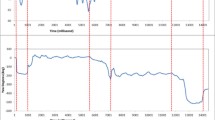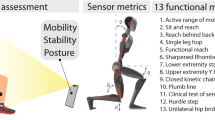Abstract
The Functional Movement ScreenTM(FMS) is a useful tool to assess functional abilities in a pre-participation screening. Its seven dynamic movement tests reveal shortcomings in stability and mobility and screen the whole body. However, the current test protocol delivers results that are subjective, qualitative and have to be manually processed. This article presents a semi-automatic system to overcome these limitations for the Deep Squat test. The system consists of four wireless inertial sensors and a central AndroidTM-based processing node for data analysis and result storage. We developed our system based on data from ten subjects and evaluated the results with the FMS scoring guidelines. The sensor-based scoring system completely agreed with the manual scoring in eight out of ten subjects. In addition, quantitative information in case of compensation movements was logged. Thus, our system is capable of simplifying the FMS test and enhances the score with objective, quantitive and automatic results.
Access this chapter
Tax calculation will be finalised at checkout
Purchases are for personal use only
Preview
Unable to display preview. Download preview PDF.
Similar content being viewed by others
References
Cook, G., et al.: Pre-Participation Screening: The Use of Fundamental Movements as an Assessment of Function - Part 1. North American Journal of Sports Physical Therapy 1(2), 62–72 (2006)
Cook, G., et al.: Pre-Participation Screening: The Use of Fundamental Movements as an Assessment of Function - Part 2. North American Journal of Sports Physical Therapy 1(3), 132–139 (2006)
Okada, T., et al.: Relationship between Core Stability, Functional Movement, and Performance. Journal of Strength and Conditioning Research 25(1), 252–261 (2011)
Parchmann, C., et al.: Relationship between Functional Movement Screen and Athletic Performance. Journal of Strength and Conditioning Research 25(12), 3378–3384 (2011)
Peate, W., et al.: Core strength: A new model for injury prediction and prevention. Journal of Occupational Medicine and Toxicology 2(1), Art. Nr. 3 (2007)
Kiesel, K., et al.: Functional Movement Test Scores Improve Following a Standardized Off-season Intervention Program in Professional Football Players. Scand. J. Med. Sci. Sports 21(2), 287–292 (2011)
Minick, K., et al.: Interrater Reliability of the Functional Movement Screen. Journal of Strength and Conditioning Research 24(2), 479–486 (2010)
Onate, J., et al.: Real-time Intersession and Interrater Reliability of the Functional Movement Screen. Journal of Strength and Conditioning Research 26(2), 408–415 (2012)
Chen, M., et al.: Body Area Networks: A Survey. Mobile Networks and Applications 2(16), 171–193 (2011)
Kugler, P., et al.: Mobile Recording System for Sport Applications. In: Proc. of the 8th International Symposium on Computer Science in Sport (IACSS 2011), Shanghai, pp. 67–70 (2011)
Barth, J., et al.: Biometric and Mobile Gait Analysis for Early Detection and Therapy Monitoring in Parkinson’s Disease. In: Proc. of the Annual International Conference of the IEEE Engineering in Medicine and Biology Society (EMBC 2011), Boston, pp. 868–871 (2011)
Eskofier, B., et al.: Embedded Classification of the Perceived Fatigue State of Runners: Towards a Body Sensor Network for Assessing the Fatigue State during Running. In: Proc. of the 9th International Conference on Wearable and Implantable Body Sensor Networks (BSN 2012), London, pp. 113–117 (2012)
McGrath, M., Dishongh, T.: A Common Personal Health Research Platform SHIMMERTM and BioMOBIUSTM. Intel Technology Journal 13(3), 122–147 (2009)
Author information
Authors and Affiliations
Editor information
Editors and Affiliations
Rights and permissions
Copyright information
© 2013 ICST Institute for Computer Science, Social Informatics and Telecommunications Engineering
About this paper
Cite this paper
Jensen, U., Weilbrenner, F., Rott, F., Eskofier, B. (2013). Sensor-Based Mobile Functional Movement Screening. In: Godara, B., Nikita, K.S. (eds) Wireless Mobile Communication and Healthcare. MobiHealth 2012. Lecture Notes of the Institute for Computer Sciences, Social Informatics and Telecommunications Engineering, vol 61. Springer, Berlin, Heidelberg. https://doi.org/10.1007/978-3-642-37893-5_25
Download citation
DOI: https://doi.org/10.1007/978-3-642-37893-5_25
Publisher Name: Springer, Berlin, Heidelberg
Print ISBN: 978-3-642-37892-8
Online ISBN: 978-3-642-37893-5
eBook Packages: Computer ScienceComputer Science (R0)




